Mary Anne Yarde's Blog: The Coffee Pot Book Club , page 59
October 28, 2020
Take a sneak-peek between the covers of S. R. Mallery's award-winning novel — Sewing Can Be Dangerous and Other Small Threads #HistoricalFiction #ShortStories @SarahMallery1
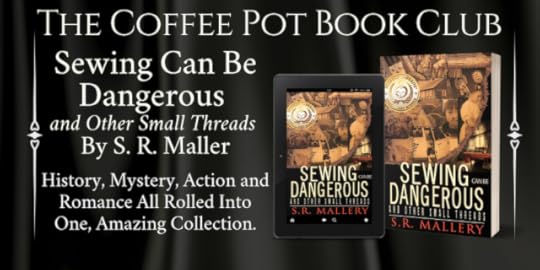
Sewing Can Be Dangerous
and Other Small Threads By S. R. Mallery
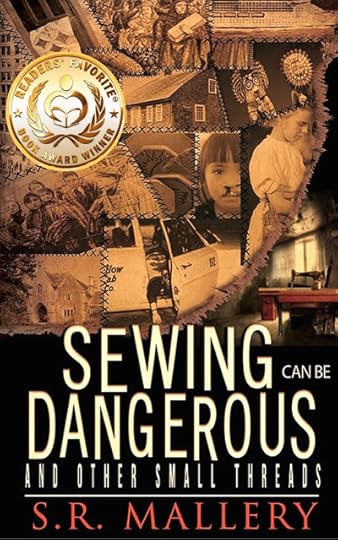
Winner of the Readers' Favorite Gold Medal!
History, Mystery, Action and Romance All Rolled Into One, Amazing Collection.
These eleven short stories range from drug traffickers using hand-woven wallets, to a U.S. slave sewing freedom codes into her quilts.
From a cruise ship murder mystery with a quilt instructor and a NYPD police detective, to a couple hiding Christian passports into a comforter in Nazi Germany.
From an old Salem Witchcraft wedding quilt curse to a young seamstress in the infamous Triangle Shirtwaist Factory fire.
From a 1980's Romeo and Juliet romance between a Wall Street financial 'star' and an eclectic fiber artist, to a Haight-Ashbury love affair between a professor and a macramé artist gone horribly wrong…just to name a few.
Excerpt
“Sewing Can Be Dangerous” –– That infamous day at the Triangle Shirtwaist Factory...
On the sidewalk outside the factory, Sasha caught up with many of the girls with whom she usually worked—three hundred Italian, German, and Yiddish girls, their thread-worn dresses hanging over muddied petticoats and eyes as dark-circled as hers. Trudging up the path, they were all met at the front entrance by Joe Zitto, one of the elevator operators.
“OK girls, OK. Let’s get goin’. The rest of the building ain’t opened today, so I’m gonna take ya’s up to the 8th, 9th and 10th floors only. Don’t try to go anywheres else for lunch. The doors to the other floors are locked mostly. I guess Old Man Harris don’t want no burglars comin’ in. So, c’mon girls, let’s go.”
Bending over her assigned sewing machine was excruciating. Her entire body ached from the previous day’s abuse; still, she kept working until lunchtime. She was in no mood to socialize—making idle chit-chat was the last thing she wanted to do, but when she retreated to a corner of the factory floor by herself, two of her closest co-workers, Gladie Moskovitz and Irma Delacina, came over to sit beside her.
“What’sa matter wid you today, Sasha?” Irma peered at her friend as she bit down hard on a piece of Italian bread, some crust flipping out of her mouth and onto the floor.
“Yah, you look different. Is evertink all right at home?” Gladie was more privy to Sasha’s problem with Moshe than Irma was.
“I don’t vant to talk about it—sometink did happen, but I not say…” Sasha feared once she started talking, there would be no stopping. Better to keep mute.
In what seemed like a mere five minutes, the whistle blew, followed by numerous deep sighs and groans. Irma threw an arm around Sasha’s shoulder on the way back to their sewing machines, and handing her a delicate-looking locket from around her own neck, told her, “Here, taka dis to wear. It’s a good luck charm necklace. I got it in Italy. If you wear it, maybe you getta good luck from now on.” She leaned over and gave her friend a little kiss on the cheek. Touched by Irma’s gesture, Sasha instinctively pulled off a little pinkie ring of her own—a small, silver Jewish star pattern with a pink stone in the center. Uncle Samuel had bought it for her the week before at a local flea market, telling her, “Remember, Sashelah, you’re American now, but always, you are a Jewish girl. Never forget the Torah, my child.”
Irma’s mouth curved into a huge grin as she placed the ring on her pinkie finger. Then the two girls gave each other a quick hug before returning to their stations.
The afternoon dragged on. Sasha found that by concentrating only on the rhythm of the sewing machines, she could block out her misery, at least for a little while. Closing her eyes and listening intently, she could almost hear the tapping of a marching band: click, click, slam-slam-slam, whoosh-whoosh, rattle-rattle went the machines. Soon, the entire factory room pulsed.
By 4:45 p.m., the whistle blew as if by magic, signaling the end of the workday and going home to face another round with Moshe. Turning off her machine, Sasha stood up, took a deep breath, and steeling herself, tried to remember the good people in her life, like Irma and Gladie, and of course, little Jacob.Three steps forward, she smelled smoke.
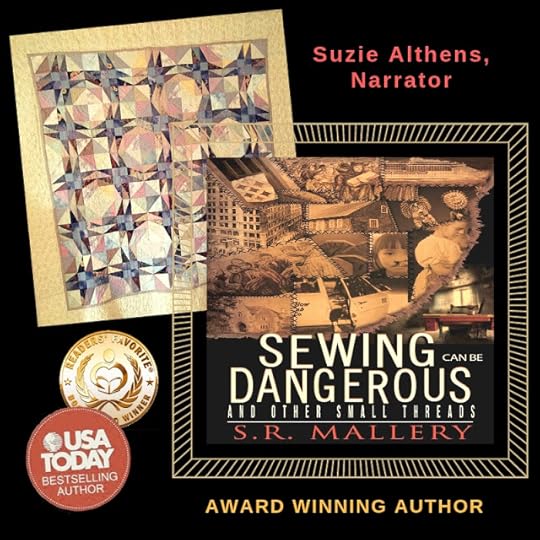
Pick up your copy of
Sewing Can Be Dangerous
Amazon UK • Amazon US
Add Sewing Can Be
Dangerous to your
'to-read' list on
Goodreads
S. R. Mallery

A USA TODAY Best Selling author and two-time READERS’ FAVORITE GOLD MEDAL winner, S. R. Mallery--as her fans say--"brings history to life."
They say I’m as eclectic as my characters. I’ve been a singer, a composer, a calligrapher, a quilt artist, and an ESL/Reading teacher. But it is the world of writing historical fiction, where I feel I’ve come "home." It’s where I've received various awards and in addition, get to do my second love: Research.
When people talk about the news of the day, or when I listen to music, my overactive imagination likens the story to a similar kind of news in the past, which helps me conjure up scenes between characters I’ve yet to meet.
Connect with S. R. Mallery:
Website • Twitter • Facebook • Goodreads • Pinterest • BookBub Author Page.
Publication Date: March 31, 2015Publisher: AmazonPage Length: 217 pagesGenre: Historical Fiction/Short Stories

Join me in conversation with #HistoricalFiction author, R.N. Morris - there is also a chance to pick up your copy of Fortune's Hand's on #Kindle for only 0.99 @rnmorris @SharpeBooks
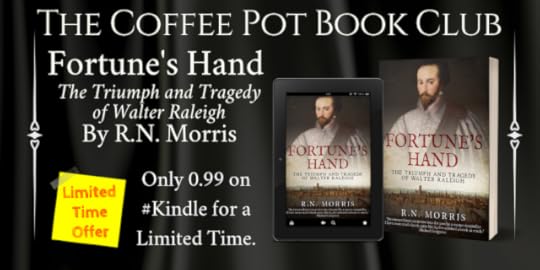
Join me in Conversation with R.N. Morris
Please give a warm Coffee Pot welcome to Historical Fiction author, R.N. Morris.

Mary Anne: A huge congratulations on your recently published book, Fortune's Hand: The Triumph and Tragedy of Walter Raleigh. Could you tell us a little about your book and how you came to write it?
R.N. Morris: The book tells the story of Walter Raleigh’s life, seen from Raleigh’s point of view as his life flashes by before him, just as the axe comes down to chop off his head. In many respects it follows the historical account, but obviously omits some things and focuses on particular incidents. I should also point out that in places it launches off into Magic-Realism-style flights of fantasy. The Raleigh of Fortune’s Hand is an all-seeing and all-knowing narrator, who has been released from the limitations of perception that mortals normally experience. It is almost as if he is dreaming his life.
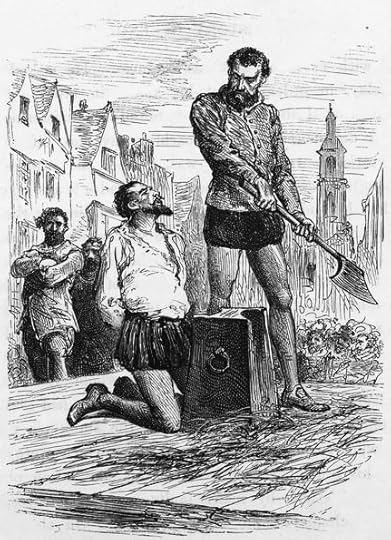 Raleigh just before he was beheaded. According to legend and Wikipedia, his last words were “Strike, man, strike!”
Raleigh just before he was beheaded. According to legend and Wikipedia, his last words were “Strike, man, strike!”I came to write it after visiting an exhibition at the British Museum about El Dorado and the search for gold. It occurred to me that these voyages of exploration into unknown territories, in the hope of discovering sources of vast wealth, were incredibly speculative endeavours, sometimes, as in Raleigh’s case, based on little more than a rumour.
In order for such expeditions to take place, the proposers, men like Raleigh, would have had to raise money from investors who would be promised untold wealth. It seemed strange to me that people would invest in these enterprises when experience showed that most of them ended in failure. Of course, for the men who went on the voyages there was a huge risk. Lives, as well as ships, were lost. And the whole experience was generally not very pleasant, fraught with hardship, brutality and danger. I certainly wouldn’t like to have crossed the Atlantic as a crew hand on an Elizabethan boat!
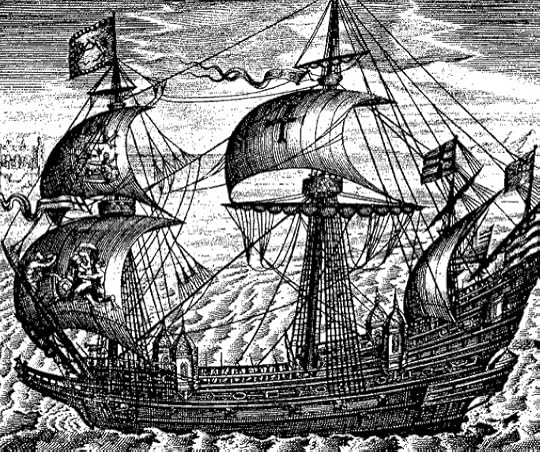 The Ark Raleigh, which was commissioned by Raleigh when he was 32. It was renamed the Ark Royal after the Queen ‘bought’ it off him by reducing the money he owed her.
The Ark Raleigh, which was commissioned by Raleigh when he was 32. It was renamed the Ark Royal after the Queen ‘bought’ it off him by reducing the money he owed her.I realised that Raleigh must have been an incredibly charismatic man, capable of inspiring others to take enormous risks. I imagine he had no compunction saying whatever he needed to get his way. History depicts him as a hero, but maybe he was a kind of Trumpian figure? Something of a blagger, perhaps, but a very persuasive one.
His greatest talent seems to have been as a self-publicist, or as a propagandist for the adventures he launched. He liked to give the impression that he was a great sailor and adventurer, but I discovered he himself did not go on as many voyages as I had thought. We think of him as the man who brought back tobacco and the potato from America. I don’t know whether that’s true or not, but he was certainly the man who took the credit for it.
In many ways he created a myth – the myth of himself – which had tremendous power during his lifetime, and even endures today. When I started thinking about the book, the image of Raleigh spreading his cloak across a puddle for the Queen, reproduced in countless school history books from the sixties and seventies, was foremost in my mind. When I was a child, I thought the point of the story was his chivalry. What a gentleman he was to sacrifice his cloak so the Queen wouldn’t get her feet wet. Now I realise that it was a metaphor: the puddle was the Atlantic Ocean, and he was proposing himself as the means to get Elizabeth across it safely. Did the incident really happen? If it did, I’m fairly sure it was not a spontaneous act of kindness on Raleigh’s part, but a carefully stage-managed piece of performance art. But whether the story is apocryphal or not is not the issue. The important thing is that the idea of it is embedded in people’s minds, even today.
Raleigh differed from Trump in that he was genuinely interested in learning from the experts of his time. He gathered around him a school of scientists, intellectuals and freethinkers, and even sought the advice of Dr John Dee, the alchemist, astrologer and conjurer of angels and demons. What he was interested in was improving navigational techniques, but he also wanted to know as much as he could about the lands his ships were venturing into. The discussions ranged freely and even got Raleigh into trouble, as he was accused of being an atheist. He was certainly a bold thinker, capable of contemplating anything, including, I don’t doubt, the possibility of a godless universe.
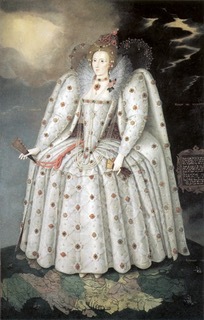 Elizabeth I, depicted striding a map.
Elizabeth I, depicted striding a map.The central relationship of the book – as it was of Raleigh’s life – is his relationship with Queen Elizabeth. It dominates even over his relationship with his wife Bess. Indeed, he was slow to acknowledge his marriage for fear of offending his queen. In writing the book, I often thought of Raleigh’s life in tidal imagery. Elizabeth was his Moon. And he was her Ocean. In fact, her nickname for him was ‘Water’, mocking his West Country pronunciation of his own name. (The book’s working title was I Am Water.) Turbulent as their relationship was, when Elizabeth died and Raleigh had to deal with the new king, he was hopelessly adrift. His charisma did not work on James. And just when he needed them most, his energy, his resources and his judgement began to fail him.
Mary Anne: Sir Walter Raleigh’s life was extraordinary, while researching his life did you stumble across any unexpected surprises?
R.N. Morris: When I began researching the book, I confess I knew very little about Walter Raleigh. So it was all new to me, and all surprising. I think the most unexpected thing I learnt was that he was not a particularly good sailor and suffered badly from seasickness. That features in the book, naturally! Also I didn’t know the story about his head – that after his death, his wife kept his severed head and carried it around in a red velvet bag. I think there’s possibly another novel in that, a companion piece perhaps, where Bess berates Raleigh’s head for all that he put her through!
 Beth Raleigh, who was said to have carried around her husband’s mummified head in a velvet bag.
Beth Raleigh, who was said to have carried around her husband’s mummified head in a velvet bag.Mary Anne: As well as an adventurer and a soldier, Sir Walter Raleigh was something of a bard. What is your favourite poem by Sir Walter Raleigh, and why does it appeal to you?
R.N. Morris: You’re right, he was a poet. One of his poems – Farewell to the Court – even gave me the title for the novel. Many courtiers were poets. Writing poetry was thought to be an essential accomplishment for a gentleman. I had this idea of them all as the Elizabethan equivalent of rappers, with the same kind of macho culture prevalent. I can even imagine rap battles taking place between rivals, which would occasionally get out of hand, with the participants reaching for their swords instead of guns.
I wanted to allude to this creative part of his life in the novel in some way, though obviously having scenes of him sitting down and writing a poem would be quite static and possibly dull. That was what led me to push the language and even include sections of blank verse.
In contrast to the epic bravado of his life, Raleigh’s own poetry can sometimes seem quite mordant, and personal. It is as if he is addressing the side of his nature that he was not able to express through his public persona. We see him giving in to regrets, doubts, fears and other emotions that he would not normally voice. At times, he can be a surprisingly self-aware and reflective poet. It’s also worth remembering that he was something of an outsider at court, coming from gentry rather than aristocracy. I think that introduced a note of bitterness into some of his poems.
Renaissance poetry in general can be quite difficult. The imagery is often obscure, the language antiquated, and the ideas so condensed that it’s hard to grasp immediately what the poet means. The great thing about Raleigh’s poetry for a modern reader is a lot of it is still accessible. That’s true, I think, of the poem that I’ve chosen, The Lie. In it we see Raleigh’s disillusionment, as he reflects on the deceit that lies behind everything he has pinned his career, life and reputation on.
Here are a few verses to give you a flavour. I particularly love the way he has constructed the opening of the second stanza, where it seems that at first he approves of the court “Say to the court, it glows…” but then quickly twists it round, with a sting in the tail even in the same sentence. It’s very skilful.
The Lie
Go, soul, the body’s guest,Upon a thankless errand;Fear not to touch the best;The truth shall be thy warrant.Go, since I needs must die,And give the world the lie.
Say to the court, it glowsAnd shines like rotten wood;Say to the church, it showsWhat’s good, and doth no good.If church and court reply,Then give them both the lie.
Tell potentates, they liveActing by others’ action;Not loved unless they give,Not strong but by a faction.If potentates reply,Give potentates the lie.
Tell men of high condition,That manage the estate,Their purpose is ambition,Their practice only hate.And if they once reply,Then give them all the lie…
Mary Anne: What do you think is the most challenging aspect of writing Historical Fiction?
R.N. Morris: This is a very interesting question. Having written about an actual historical figure, and quite a famous one at that, I was going to say the challenge of separating the man from the myth. But actually, what I think I ended up doing was playing with both the myth and the man, if you like, so it actually became quite fun.
More of a challenge, for any historical writer, is how to make the past relevant to contemporary readers. I think this is especially an issue at the moment, when the world is looking very critically at, for example, the colonialism of the past. A lot of people would reasonably say, why on earth write a book about Raleigh, who was the arch colonialist? His whole life was dedicated to going into other people’s lands and appropriating and exploiting what he found there. Then there was the whole issue of capturing Spanish galleons and seizing their cargoes. Of course, for the men involved it was a great, if desperate game. But really it was just licensed pillaging - not the kind of thing people approve of these days.And so that period of our history is very problematic. Attitudes and beliefs that were ingrained then are seen, quite rightly, as appalling now, or simply baffling. What you have to be careful not to do is simply transport modern characters back to an earlier era and put them in costume, so that they speak and act in a way that will be acceptable to the modern reader, but which is actually completely anachronistic.
At the same time, you want your characters to be recognisably human. They can’t be so alien that modern readers have no way to access their emotions, struggles and stories. So for me, writing historical fiction is about forming a bond with the past – or at least with our idea of the past. At the same time, we have to be honest, and own up to the horrors of the past. The historical novelist Lawrence Norfolk has read the book and he called Raleigh, amongst other things, a ‘sentimental war criminal’, which I think is spot on. I won’t go into the atrocities he was responsible for in Ireland here, you’ll have to read the book.
I believe very much that historical fiction is a prism through which we view the present. Every age reinvents the past to tell its own story. My attitude to Raleigh in the book is critical. It has to be. I think he’s a very flawed individual with a definite dark side.
What led me to Raleigh was an interest in the way human beings are driven to undertake bold, outrageous, even nonsensical ventures in the pursuit of a dream. The dream itself may well be tarnished or even illusory. Dreams are illusions, after all. If he was alive today, Raleigh might well be a tech entrepreneur in Silicon Valley, hustling to raise money for his next project. It may seem a bathetic comparison, but the main reason Raleigh did what he did was to enrich himself. The idea of the British Empire was arguably first conceived around this time by Dr John Dee. It was from its outset a grandiose cover for an exercise in looting. A cloak, you might say.
 Dr John Dee, the Queen’s astronomer.
Dr John Dee, the Queen’s astronomer.Mary Anne: What advice do you have for aspiring Historical Fiction authors?
R.N. Morris: Do your research, obviously, but try not to get bogged down in it. What you are trying to do is reach a point where you can close all the history books, put them to one side and start telling a story. For me, the purpose of the research is to feed my imagination. The secret therefore is to trust your imagination. I also think you have to learn what to leave out as well as what to put in. You may have discovered some fascinating nugget of information that you’re desperate to share with people. But if it doesn’t advance your story, it shouldn’t be in there. You can save it for the pub, or for when you’re interviewed for Coffee Pot Book Club.
Hope that helps!
Mary Anne: Thank you so much for taking time out of your day to chat to us.
If you would like to find out more about R.N Morris' fabulous book then you know what to do – SCROLL DOWN!
Fortune's Hand
The Triumph and Tragedy of
Walter Raleigh
By R.N. Morris
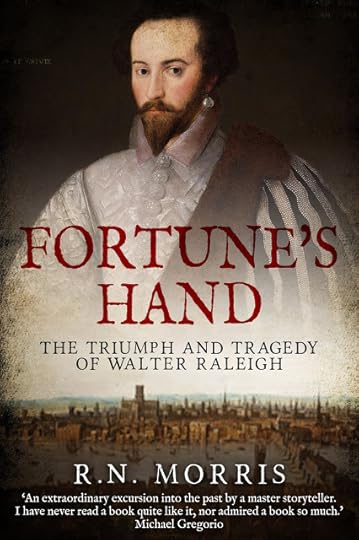
Adventurer, soldier, courtier, poet, prisoner – outsider.
Drawn by ambition to Elizabeth’s court, Walter Raleigh soon becomes the queen’s favourite. But his meteoric rise attracts the enmity of powerful rivals.
Sir Francis Walsingham, the queen’s spy master, proves a dangerous enemy.
While the Earl of Oxford is an equally dangerous friend.
Even Elizabeth’s favour is an uncertain gift. It can be withdrawn on a whim as easily as it is granted and earns him as much trouble as it does profit.
Seeking gold for his queen and glory for himself, Raleigh launches a series of ever more reckless adventures.
The ultimate prize he dreams of is the fabled city of Eldorado in the New World. He is possessed by the dream.
After Elizabeth’s death, Raleigh fails to find favour with the new king and is imprisoned in the Tower.
To restore his reputation, he embarks on his most desperate venture yet.
By now an old and broken man, he risks everything to discover the city of his dreams.
Excerpt
Oakfast
I see the acorn falling to the ground, full of energy and intent. The stippled cup splits. A tiny tongue licks out.
I see it. I see it all. Now.
This tongue, a shoot, parts the sodden ground, probing it with its insinuating tip. Taking root.
It is Nature’s business to be questing.
I see this. Though it happens within the closed darkness of the soil.
The speed of it would take your breath away.
And above, another shoot hurtles upwards, a fine jet of living matter fired towards the Sun.
The stem writhes as it grows, whipping the air. It is almost too fast for itself, has not the strength to support its vaunting height. Quick, quick, quickening, it girds itself with growth, thickening into a sapling’s adolescent tremor.
I see the parting and spreading of the roots, the restless subterranean colonisation. It is the nature of all life, the urge to encroach.
I see the orb of the heavens wheel about. I see the Sun on its ceaseless course, a bouncing ball across the horizon. The waxing and waning of countless moons. The slow strophes of an eternal dance sped up into a frantic jig.
I see the sapling’s tremor steady as it takes on girth. The Sun warms its coarsening skin. It is lashed by downpours. Bent by winds. Pert and unbowed, it springs back, the stamp of its future stalwart nature already showing. It laps up the rain.
A fountain of tendrils shoots out from the stem, lightning thrown back at the sky: the young plant’s first branches. No sooner have they waved themselves into rude existence, than a rash of green bursts over them. The leaves are lips that kiss the sky.
The elastic vigour quickly slackens. Autumn’s golden cloak crackles like a benign fire over the branches.
Boughs thicken, effortlessly bearing their swaying burden. Acorns!
I see this.
I see the secret accretions building within. Each summer’s growth encircling the last.
The tree stands its ground, chests itself out like a warrior, staking its claim for a corner of the forest. But is never still. Its thrusting energy strains ever outwards and upwards.
I see the acorn falling to the ground. I see a host of acorns falling. I see forests shooting up. I see the Earth colonised by the Empire of Oak.
And then I see them come into the forests. The men.
I see men differently now. The oak is more my brother.
The men are kindred with the mites that flit in the sunshine. With the spiders that weave between the leaves. With the woodlice and maggots that scuttle and twitch in the forest’s darkest places.
They seek out the finest, grandest oak. I see them survey it with proprietary pride, abrogating its creation to their own account. It is theirs already. Its monumental steadfastness a challenge to their quicksilver wits.
They wield their axes with a sidelong swoop. Two men planting alternate blows, digging the future out of the tree’s flesh with remorseless precision. The blows lack reverberation, empty dead clacks hushed up by the surrounding forest, as if in shame.
A pulpy wound deepens. The men’s shoulders grow as their work progresses. I see the sweat on their brow, the crook of their wrist as they wipe it away.
A thunderclap cracks within the stricken tree. The men step back, their final blow a sharp nod of twin satisfaction. The forest quakes. The leaves shiver on the outspread tremble of branches. The tree topples into timber.
A horse as big as a dromedary drags it over to the saw pit. The men fall on it like locusts. It doesn’t stand a chance against their savage rip saws and adzes. Their hearty muscular swinging of blades. Their oaths and earthy songs. Their cunning wielding of the unwieldy. I see the long flexing metal snap into shape, biting when bidden.
I see this happening all over the forest. Other men bringing low other trees. And in other forests, the same thing.
The forests are converted into open ground, piled high with massive logs.
But it is not over yet. The hurtling of the oak.
The stripped logs are rolled and loaded onto wagons, which hurtle and rattle along country lanes. Or they float in solid torrent towards a new becoming.
The Empire of Oak has been conquered, enslaved, transported. Now it will serve the Empire of Man.
It hurtles into the sawmill, eager for its reformation.
I see the fine, unrelenting teeth of enormous saws.
Water turns the wheel that drives the gang saw, a swinging chisel-toothed pendulum that measures the tree’s end and the ship’s beginning. It is somehow appropriate that water powers this transition.
I see the saw’s teeth sink into the timber. Sawdust fills my eyes. I do not blink.
Sawing and hewing and rasping and shaping. A focused bustle of activity.
The men throw themselves at it, all hands to the latent decks.
I see the swift, smooth glide of the plane, as rough logs are tamed. The men peel off planks and beams and masts, the timbers of a preordained fleet.
Fleet! One word expresses the hastening destiny of the oak.
The raw wood hurtles on, to the shipyards now.
Here I see the timbers bent and beckoned into shape. The workmen stand sweating over pits of humid ash. Steam seeps into the grain, loosening the fibres of the wood, making malleable that unyielding matter. It is slow, aching, patient work. But to my eyes, it happens in an instant. The great wood beams curl like furled paper.
The hefting and hammering begins. The shaped timbers offered up and butted, joints mallet-slammed together. A skeleton of oak forms. The boards fly onto it, as fast as the ruffling of a hawk’s feathers. I see the nails fly into the boards, the neat carvel hull complete in the unblinking of my eyes. This is not industry, it is conjuring. The wood of six-hundred trees flies together to form one ship.
Miles of rigging, the ropes from Muscovy, the cordage wound and bound into dense bundles, all are hauled on board and stowed. The folded sails are borne with reverence and ceremony, sacraments on a vast scale.
I see the towering masts rise up. And hear the cheer that rises with them. I smell the tar that caulks the keel.
The quarters are subdivided and fitted, before the mainmast for the men, behind the mainmast for the gentlemen and officers. Chisels snout out details. Abrasive blocks wear away the wood’s last coarseness. Under the master carpenter’s overseeing eye, beneath the touch of his fine, critical fingers, a perfect surface emerges. He blows away the flecks that mar it.
And now a carnival, a riotous assembly. Exultant colour splashes onto primed and burnished ornamenting. The brushes dance in the artisans’ hands. But the music that accompanies this is a solemn death march. The sonorous rumble of the guns manoeuvred into place.
This is what it has all been about, so far, the placing of the guns. For what is this vessel but a courier of cannon fire? The cargo it will trade in: death.
The ovens are built, deep in the ship’s belly. In a universe of wood, the fire must be held in brick prisons.
I see the barrels of supplies, the salted meat and fish, the hard tack, the casks of pickled and dried produce, the butts of drinking water, beer and brandy. And the livestock too. The capons and chickens. The goats. Sustenance for the men who will set the course, steer the ship, climb the rigging, swab the decks, for those who will drink and swear and brawl, who will man the watch, who will sicken and die, who will live to tell the tale. But above all, for the men who will load and aim and fire the cannon, for that is what they are all about.
I see them now, the crew, filing on. They bring with them a couple of cats and a dog, platters and tankards and backgammon boards, playing cards, knives – for cutting food, whittling wood and settling arguments – fiddles, whistles, bass viol and drum, even a portative organ for the captain’s company of musicians. One or two may bring a Bible or some other, more dangerous tract.
I see them teem over the decks, a flood of life, raucous and unruly. There is a whetted edge to them, sharp enough to kill. They have that glint in their eyes, a keen hunger: they are avid for movement and action and plunder. They see the prize already. They look into the empty hold and see its expected cargo manifest. The plate, the coins, the gold.
I have looked through eyes like theirs.
And now I see the floodgates open. I see the inundation. The dry dock is no more. The ship at last is in her element.
Another cheer, as the men feel the kick of buoyancy enter their legs, the sudden, giddy instability that can reduce even the saltiest dog to sickness. They know there is no going back. The water will bear them to their destiny.
The hurtling continues. The onrush of oak.
The first commands go out. The sails are raised. The cries of the men are lusty and eager. They are pulling together, with a common purpose. The river widens into estuary. The tide, the wind, the gulls concur. The ocean opens up before them.
But it is not just this one ship I see. I see others too. Setting sail from other shipyards. On other days. (The links of time have been unchained for me now. The minutes, hours and days do not connect. It is one of the ways I see things differently.)
A great hurtling from the forest to the sea.
The energy and intent of the acorn.
All this I see.
Pick up your copy ofFortune's Hand Amazon UK • Amazon USAdd Fortune's Hand to your 'to-read' list on Goodreads
R.N. Morris

Roger (R. N.) Morris is the author of thirteen novels.
The latest is Fortune’s Hand, a historical novel about Walter Raleigh. He is also the author of the Silas Quinn series of historical crime novels. The series, set in London in 1914, began with Summon Up The Blood, followed by The Mannequin House, The Dark Palace, The Red Hand of Fury and The White Feather Killer and The Music Box Enigma.
A Gentle Axe was published by Faber and Faber in 2007. Set in St Petersburg in the nineteenth century, it features Porfiry Petrovich, the investigating magistrate from Dostoevsky’s great novel, Crime and Punishment. The book was published in many countries, including Russia. He followed that up with A Vengeful Longing, which was shortlisted for the Duncan Lawrie Dagger Award (as the CWA Gold Dagger was briefly known). A Razor Wrapped in Silk came next, followed by The Cleansing Flames, which was nominated for the Ellis Peters Historical Novel Dagger.
He also wrote the dystopian thriller PSYCHOTOPIA.
Taking Comfort is a standalone contemporary novel, written as Roger Morris.
Connect with R.N. Morris:
Website • Facebook • Twitter • Instagram.
Publication Date: 17th August 2020Publisher: Sharpe BooksPage Length: 271 PagesGenre: Historical Fiction
Welcome to the final stop of the blog tour for Drake: Tudor Corsair #HistoricalFiction #SirFrancisDrake #BookReview @tonyriches @caigjamie

DRAKE - TUDOR CORSAIR (THE ELIZABETHAN SERIES BOOK 1)BY TONY RICHES

 August 19th - October 21st 2020AMAZON UK • AMAZON US • AMAZON CA • AMAZON AU
August 19th - October 21st 2020AMAZON UK • AMAZON US • AMAZON CA • AMAZON AUPublication Date: 5th August 2020 Publisher: Preseli Press Ltd. Print Length: 344 pages Genre: Historical Fiction 1564 Devon sailor Francis Drake sets out on a journey of adventure. Drake learns of routes used to transport Spanish silver and gold, and risks his life in an audacious plan to steal a fortune. Queen Elizabeth is intrigued by Drake and secretly encourages his piracy. Her unlikely champion becomes a national hero, sailing around the world in the Golden Hind and attacking the Spanish fleet. King Philip of Spain has enough of Drake’s plunder and orders an armada to threaten the future of England.
The final stop of the tour is over on The Whispering Bookworm, for a fabulous review!
Click HERE!

Welcome to Day #8 of the blog tour for The Potential for Love: A Regency Novel by Catherine Kullmann #RegencyRomance #CoffeePotBookClub @CKullmannAuthor @SylvDotNet

THE POTENTIAL FOR LOVE: A REGENCY NOVELBY CATHERINE KULLMANN
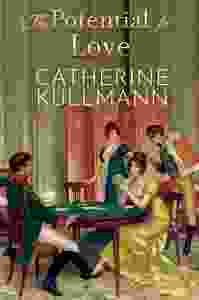

OCTOBER 19TH - OCTOBER 30TH 2020AMAZON • WATERSTONES • BARNES AND NOBLE
Publication Date: 31 March 2020
Publisher: Willow Books
Print Length: 414 Pages
Genre: Historical Fiction/Historical Romance/Regency Romance/Historical Women’s Fiction
1816
For over six years, Thomas Ferraunt’s thoughts have been of war. Newly returned to England from occupied Paris, he must ask himself what his place is in this new world and what he wants from it. More and more, his thoughts turn to Arabella Malvin, but would Lord Malvin agree to such a mismatch for his daughter, especially when she is being courted by Lord Henry Danlow?
About to embark on her fourth Season, Arabella is tired of the life of a debutante, waiting in the wings for her real life to begin. She is ready to marry. But which of her suitors has the potential for love and who will agree to the type of marriage she wants?
As she struggles to make her choice, she is faced with danger from an unexpected quarter while Thomas is stunned by a new challenge. Will these events bring them together or drive them apart?
We are celebrating the release of the special hardback edition of The Potential for Love during this tour. With a beautiful dust jacket over an elegant laminated cover, it will enhance any library and is the perfect gift for lovers of historical women’s fiction and historical romance.
Have a sneak-peak between the covers of The Potential for Love over on Sylv.net.
Click HERE!

Welcome to Day #1 of the blog tour for - Three Monkeys (DCI Jack Callum Mysteries Book 1) by Len Maynard #HistoricalFiction #Crime @len_maynard

Three Monkeys(DCI Jack Callum Mysteries Book 1)By Len Maynard

 October 28th – December 30th 2020Amazon UK • Amazon US
October 28th – December 30th 2020Amazon UK • Amazon USPublication Date: 22nd July 2020
Publisher: Sharpe Books
Page Length: 270 Pages
Genre: Historical Crime
1958.
A girl’s body is found in Hertfordshire.
Her eyes and mouth have been sewn shut. Candle wax has been poured into her ears to seal them.
DCI Jack Callum, policeman and dedicated family man, who cut his teeth walking the beat on the violent streets of London, before moving his family away from the city, to a safer, more restful life in the country, leads the investigation into this gruesome crime that shatters the peace of the sleepy English town.
Images of three monkeys are sent to the police to taunt them: see no evil, hear no evil, speak no evil. Something more sinister than a mere isolated murder seems to be going on as more victims come to light.
Who is doing this and why?
At the insistence of the first victim’s father, a local dignitary, officers from Scotland Yard are brought in to bring about a speedy conclusion to the case, side-lining Jack’s own investigation.
In a nail-biting climax, one of Jack’s daughters is snatched. Before she can become the next victim, Jack has to go against the orders of his superiors that have constantly hampered his investigation, and risk his own career in an attempted rescue at the killer’s own home.
About the author

Len Maynard was born in North London in 1953.
In 1978, a book of short ghost stories, written in collaboration with Michael Sims, was published by London publisher William Kimber. For the following forty years the pair wrote ten more collections of ghost stories before moving into novels in 2006, completing over thirty more books, including the successful Department 18 series of supernatural/crime crossover novels as well as several standalone novels and novellas in the supernatural and crime genres. Always a keen reader of crime novels, and with a passion for the social history of the twentieth century it was fairly inevitable that, when he decided to branch out and write under his own name, some kind of combination of these two interests would occur. The six DCI Jack Callum Mysteries were the result of several years of total immersion in the world he created for Jack Callum, his family, his friends (and enemies) and his work colleagues. He has also written a trilogy of adventure thrillers set in the Bahamas (also available from Sharpe Books) He is currently at work on the seventh book in the DCI Jack Callum series.
We are starting our tour over on A Darn Good Read, for a sneak-peak between the covers of Three Monkeys.
Click HERE!
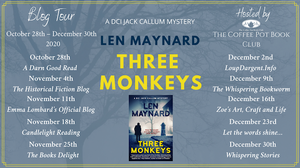

October 27, 2020
Join me in conversation with #HistoricalFiction author, R.N. Morris #AuthorInterview #Tudors @rnmorris @SharpeBooks

Join me in Conversation with R.N. Morris
Please give a warm Coffee Pot welcome to Historical Fiction author, R.N. Morris.

Mary Anne: A huge congratulations on your recently published book, Fortune's Hand: The Triumph and Tragedy of Walter Raleigh. Could you tell us a little about your book and how you came to write it?
R.N. Morris: The book tells the story of Walter Raleigh’s life, seen from Raleigh’s point of view as his life flashes by before him, just as the axe comes down to chop off his head. In many respects it follows the historical account, but obviously omits some things and focuses on particular incidents. I should also point out that in places it launches off into Magic-Realism-style flights of fantasy. The Raleigh of Fortune’s Hand is an all-seeing and all-knowing narrator, who has been released from the limitations of perception that mortals normally experience. It is almost as if he is dreaming his life.
 Raleigh just before he was beheaded. According to legend and Wikipedia, his last words were “Strike, man, strike!”
Raleigh just before he was beheaded. According to legend and Wikipedia, his last words were “Strike, man, strike!”I came to write it after visiting an exhibition at the British Museum about El Dorado and the search for gold. It occurred to me that these voyages of exploration into unknown territories, in the hope of discovering sources of vast wealth, were incredibly speculative endeavours, sometimes, as in Raleigh’s case, based on little more than a rumour.
In order for such expeditions to take place, the proposers, men like Raleigh, would have had to raise money from investors who would be promised untold wealth. It seemed strange to me that people would invest in these enterprises when experience showed that most of them ended in failure. Of course, for the men who went on the voyages there was a huge risk. Lives, as well as ships, were lost. And the whole experience was generally not very pleasant, fraught with hardship, brutality and danger. I certainly wouldn’t like to have crossed the Atlantic as a crew hand on an Elizabethan boat!
 The Ark Raleigh, which was commissioned by Raleigh when he was 32. It was renamed the Ark Royal after the Queen ‘bought’ it off him by reducing the money he owed her.
The Ark Raleigh, which was commissioned by Raleigh when he was 32. It was renamed the Ark Royal after the Queen ‘bought’ it off him by reducing the money he owed her.I realised that Raleigh must have been an incredibly charismatic man, capable of inspiring others to take enormous risks. I imagine he had no compunction saying whatever he needed to get his way. History depicts him as a hero, but maybe he was a kind of Trumpian figure? Something of a blagger, perhaps, but a very persuasive one.
His greatest talent seems to have been as a self-publicist, or as a propagandist for the adventures he launched. He liked to give the impression that he was a great sailor and adventurer, but I discovered he himself did not go on as many voyages as I had thought. We think of him as the man who brought back tobacco and the potato from America. I don’t know whether that’s true or not, but he was certainly the man who took the credit for it.
In many ways he created a myth – the myth of himself – which had tremendous power during his lifetime, and even endures today. When I started thinking about the book, the image of Raleigh spreading his cloak across a puddle for the Queen, reproduced in countless school history books from the sixties and seventies, was foremost in my mind. When I was a child, I thought the point of the story was his chivalry. What a gentleman he was to sacrifice his cloak so the Queen wouldn’t get her feet wet. Now I realise that it was a metaphor: the puddle was the Atlantic Ocean, and he was proposing himself as the means to get Elizabeth across it safely. Did the incident really happen? If it did, I’m fairly sure it was not a spontaneous act of kindness on Raleigh’s part, but a carefully stage-managed piece of performance art. But whether the story is apocryphal or not is not the issue. The important thing is that the idea of it is embedded in people’s minds, even today.
Raleigh differed from Trump in that he was genuinely interested in learning from the experts of his time. He gathered around him a school of scientists, intellectuals and freethinkers, and even sought the advice of Dr John Dee, the alchemist, astrologer and conjurer of angels and demons. What he was interested in was improving navigational techniques, but he also wanted to know as much as he could about the lands his ships were venturing into. The discussions ranged freely and even got Raleigh into trouble, as he was accused of being an atheist. He was certainly a bold thinker, capable of contemplating anything, including, I don’t doubt, the possibility of a godless universe.
 Elizabeth I, depicted striding a map.
Elizabeth I, depicted striding a map.The central relationship of the book – as it was of Raleigh’s life – is his relationship with Queen Elizabeth. It dominates even over his relationship with his wife Bess. Indeed, he was slow to acknowledge his marriage for fear of offending his queen. In writing the book, I often thought of Raleigh’s life in tidal imagery. Elizabeth was his Moon. And he was her Ocean. In fact, her nickname for him was ‘Water’, mocking his West Country pronunciation of his own name. (The book’s working title was I Am Water.) Turbulent as their relationship was, when Elizabeth died and Raleigh had to deal with the new king, he was hopelessly adrift. His charisma did not work on James. And just when he needed them most, his energy, his resources and his judgement began to fail him.
Mary Anne: Sir Walter Raleigh’s life was extraordinary, while researching his life did you stumble across any unexpected surprises?
R.N. Morris: When I began researching the book, I confess I knew very little about Walter Raleigh. So it was all new to me, and all surprising. I think the most unexpected thing I learnt was that he was not a particularly good sailor and suffered badly from seasickness. That features in the book, naturally! Also I didn’t know the story about his head – that after his death, his wife kept his severed head and carried it around in a red velvet bag. I think there’s possibly another novel in that, a companion piece perhaps, where Bess berates Raleigh’s head for all that he put her through!
 Beth Raleigh, who was said to have carried around her husband’s mummified head in a velvet bag.
Beth Raleigh, who was said to have carried around her husband’s mummified head in a velvet bag.Mary Anne: As well as an adventurer and a soldier, Sir Walter Raleigh was something of a bard. What is your favourite poem by Sir Walter Raleigh, and why does it appeal to you?
R.N. Morris: You’re right, he was a poet. One of his poems – Farewell to the Court – even gave me the title for the novel. Many courtiers were poets. Writing poetry was thought to be an essential accomplishment for a gentleman. I had this idea of them all as the Elizabethan equivalent of rappers, with the same kind of macho culture prevalent. I can even imagine rap battles taking place between rivals, which would occasionally get out of hand, with the participants reaching for their swords instead of guns.
I wanted to allude to this creative part of his life in the novel in some way, though obviously having scenes of him sitting down and writing a poem would be quite static and possibly dull. That was what led me to push the language and even include sections of blank verse.
In contrast to the epic bravado of his life, Raleigh’s own poetry can sometimes seem quite mordant, and personal. It is as if he is addressing the side of his nature that he was not able to express through his public persona. We see him giving in to regrets, doubts, fears and other emotions that he would not normally voice. At times, he can be a surprisingly self-aware and reflective poet. It’s also worth remembering that he was something of an outsider at court, coming from gentry rather than aristocracy. I think that introduced a note of bitterness into some of his poems.
Renaissance poetry in general can be quite difficult. The imagery is often obscure, the language antiquated, and the ideas so condensed that it’s hard to grasp immediately what the poet means. The great thing about Raleigh’s poetry for a modern reader is a lot of it is still accessible. That’s true, I think, of the poem that I’ve chosen, The Lie. In it we see Raleigh’s disillusionment, as he reflects on the deceit that lies behind everything he has pinned his career, life and reputation on.
Here are a few verses to give you a flavour. I particularly love the way he has constructed the opening of the second stanza, where it seems that at first he approves of the court “Say to the court, it glows…” but then quickly twists it round, with a sting in the tail even in the same sentence. It’s very skilful.
The Lie
Go, soul, the body’s guest,Upon a thankless errand;Fear not to touch the best;The truth shall be thy warrant.Go, since I needs must die,And give the world the lie.
Say to the court, it glowsAnd shines like rotten wood;Say to the church, it showsWhat’s good, and doth no good.If church and court reply,Then give them both the lie.
Tell potentates, they liveActing by others’ action;Not loved unless they give,Not strong but by a faction.If potentates reply,Give potentates the lie.
Tell men of high condition,That manage the estate,Their purpose is ambition,Their practice only hate.And if they once reply,Then give them all the lie…
Mary Anne: What do you think is the most challenging aspect of writing Historical Fiction?
R.N. Morris: This is a very interesting question. Having written about an actual historical figure, and quite a famous one at that, I was going to say the challenge of separating the man from the myth. But actually, what I think I ended up doing was playing with both the myth and the man, if you like, so it actually became quite fun.
More of a challenge, for any historical writer, is how to make the past relevant to contemporary readers. I think this is especially an issue at the moment, when the world is looking very critically at, for example, the colonialism of the past. A lot of people would reasonably say, why on earth write a book about Raleigh, who was the arch colonialist? His whole life was dedicated to going into other people’s lands and appropriating and exploiting what he found there. Then there was the whole issue of capturing Spanish galleons and seizing their cargoes. Of course, for the men involved it was a great, if desperate game. But really it was just licensed pillaging - not the kind of thing people approve of these days.And so that period of our history is very problematic. Attitudes and beliefs that were ingrained then are seen, quite rightly, as appalling now, or simply baffling. What you have to be careful not to do is simply transport modern characters back to an earlier era and put them in costume, so that they speak and act in a way that will be acceptable to the modern reader, but which is actually completely anachronistic.
At the same time, you want your characters to be recognisably human. They can’t be so alien that modern readers have no way to access their emotions, struggles and stories. So for me, writing historical fiction is about forming a bond with the past – or at least with our idea of the past. At the same time, we have to be honest, and own up to the horrors of the past. The historical novelist Lawrence Norfolk has read the book and he called Raleigh, amongst other things, a ‘sentimental war criminal’, which I think is spot on. I won’t go into the atrocities he was responsible for in Ireland here, you’ll have to read the book.
I believe very much that historical fiction is a prism through which we view the present. Every age reinvents the past to tell its own story. My attitude to Raleigh in the book is critical. It has to be. I think he’s a very flawed individual with a definite dark side.
What led me to Raleigh was an interest in the way human beings are driven to undertake bold, outrageous, even nonsensical ventures in the pursuit of a dream. The dream itself may well be tarnished or even illusory. Dreams are illusions, after all. If he was alive today, Raleigh might well be a tech entrepreneur in Silicon Valley, hustling to raise money for his next project. It may seem a bathetic comparison, but the main reason Raleigh did what he did was to enrich himself. The idea of the British Empire was arguably first conceived around this time by Dr John Dee. It was from its outset a grandiose cover for an exercise in looting. A cloak, you might say.
 Dr John Dee, the Queen’s astronomer.
Dr John Dee, the Queen’s astronomer.Mary Anne: What advice do you have for aspiring Historical Fiction authors?
R.N. Morris: Do your research, obviously, but try not to get bogged down in it. What you are trying to do is reach a point where you can close all the history books, put them to one side and start telling a story. For me, the purpose of the research is to feed my imagination. The secret therefore is to trust your imagination. I also think you have to learn what to leave out as well as what to put in. You may have discovered some fascinating nugget of information that you’re desperate to share with people. But if it doesn’t advance your story, it shouldn’t be in there. You can save it for the pub, or for when you’re interviewed for Coffee Pot Book Club.
Hope that helps!
Mary Anne: Thank you so much for taking time out of your day to chat to us.
If you would like to find out more about R.N Morris' fabulous book then you know what to do – SCROLL DOWN!
Fortune's Hand
The Triumph and Tragedy of
Walter Raleigh
By R.N. Morris

Adventurer, soldier, courtier, poet, prisoner – outsider.
Drawn by ambition to Elizabeth’s court, Walter Raleigh soon becomes the queen’s favourite. But his meteoric rise attracts the enmity of powerful rivals.
Sir Francis Walsingham, the queen’s spy master, proves a dangerous enemy.
While the Earl of Oxford is an equally dangerous friend.
Even Elizabeth’s favour is an uncertain gift. It can be withdrawn on a whim as easily as it is granted and earns him as much trouble as it does profit.
Seeking gold for his queen and glory for himself, Raleigh launches a series of ever more reckless adventures.
The ultimate prize he dreams of is the fabled city of Eldorado in the New World. He is possessed by the dream.
After Elizabeth’s death, Raleigh fails to find favour with the new king and is imprisoned in the Tower.
To restore his reputation, he embarks on his most desperate venture yet.
By now an old and broken man, he risks everything to discover the city of his dreams.
Excerpt
Oakfast
I see the acorn falling to the ground, full of energy and intent. The stippled cup splits. A tiny tongue licks out.
I see it. I see it all. Now.
This tongue, a shoot, parts the sodden ground, probing it with its insinuating tip. Taking root.
It is Nature’s business to be questing.
I see this. Though it happens within the closed darkness of the soil.
The speed of it would take your breath away.
And above, another shoot hurtles upwards, a fine jet of living matter fired towards the Sun.
The stem writhes as it grows, whipping the air. It is almost too fast for itself, has not the strength to support its vaunting height. Quick, quick, quickening, it girds itself with growth, thickening into a sapling’s adolescent tremor.
I see the parting and spreading of the roots, the restless subterranean colonisation. It is the nature of all life, the urge to encroach.
I see the orb of the heavens wheel about. I see the Sun on its ceaseless course, a bouncing ball across the horizon. The waxing and waning of countless moons. The slow strophes of an eternal dance sped up into a frantic jig.
I see the sapling’s tremor steady as it takes on girth. The Sun warms its coarsening skin. It is lashed by downpours. Bent by winds. Pert and unbowed, it springs back, the stamp of its future stalwart nature already showing. It laps up the rain.
A fountain of tendrils shoots out from the stem, lightning thrown back at the sky: the young plant’s first branches. No sooner have they waved themselves into rude existence, than a rash of green bursts over them. The leaves are lips that kiss the sky.
The elastic vigour quickly slackens. Autumn’s golden cloak crackles like a benign fire over the branches.
Boughs thicken, effortlessly bearing their swaying burden. Acorns!
I see this.
I see the secret accretions building within. Each summer’s growth encircling the last.
The tree stands its ground, chests itself out like a warrior, staking its claim for a corner of the forest. But is never still. Its thrusting energy strains ever outwards and upwards.
I see the acorn falling to the ground. I see a host of acorns falling. I see forests shooting up. I see the Earth colonised by the Empire of Oak.
And then I see them come into the forests. The men.
I see men differently now. The oak is more my brother.
The men are kindred with the mites that flit in the sunshine. With the spiders that weave between the leaves. With the woodlice and maggots that scuttle and twitch in the forest’s darkest places.
They seek out the finest, grandest oak. I see them survey it with proprietary pride, abrogating its creation to their own account. It is theirs already. Its monumental steadfastness a challenge to their quicksilver wits.
They wield their axes with a sidelong swoop. Two men planting alternate blows, digging the future out of the tree’s flesh with remorseless precision. The blows lack reverberation, empty dead clacks hushed up by the surrounding forest, as if in shame.
A pulpy wound deepens. The men’s shoulders grow as their work progresses. I see the sweat on their brow, the crook of their wrist as they wipe it away.
A thunderclap cracks within the stricken tree. The men step back, their final blow a sharp nod of twin satisfaction. The forest quakes. The leaves shiver on the outspread tremble of branches. The tree topples into timber.
A horse as big as a dromedary drags it over to the saw pit. The men fall on it like locusts. It doesn’t stand a chance against their savage rip saws and adzes. Their hearty muscular swinging of blades. Their oaths and earthy songs. Their cunning wielding of the unwieldy. I see the long flexing metal snap into shape, biting when bidden.
I see this happening all over the forest. Other men bringing low other trees. And in other forests, the same thing.
The forests are converted into open ground, piled high with massive logs.
But it is not over yet. The hurtling of the oak.
The stripped logs are rolled and loaded onto wagons, which hurtle and rattle along country lanes. Or they float in solid torrent towards a new becoming.
The Empire of Oak has been conquered, enslaved, transported. Now it will serve the Empire of Man.
It hurtles into the sawmill, eager for its reformation.
I see the fine, unrelenting teeth of enormous saws.
Water turns the wheel that drives the gang saw, a swinging chisel-toothed pendulum that measures the tree’s end and the ship’s beginning. It is somehow appropriate that water powers this transition.
I see the saw’s teeth sink into the timber. Sawdust fills my eyes. I do not blink.
Sawing and hewing and rasping and shaping. A focused bustle of activity.
The men throw themselves at it, all hands to the latent decks.
I see the swift, smooth glide of the plane, as rough logs are tamed. The men peel off planks and beams and masts, the timbers of a preordained fleet.
Fleet! One word expresses the hastening destiny of the oak.
The raw wood hurtles on, to the shipyards now.
Here I see the timbers bent and beckoned into shape. The workmen stand sweating over pits of humid ash. Steam seeps into the grain, loosening the fibres of the wood, making malleable that unyielding matter. It is slow, aching, patient work. But to my eyes, it happens in an instant. The great wood beams curl like furled paper.
The hefting and hammering begins. The shaped timbers offered up and butted, joints mallet-slammed together. A skeleton of oak forms. The boards fly onto it, as fast as the ruffling of a hawk’s feathers. I see the nails fly into the boards, the neat carvel hull complete in the unblinking of my eyes. This is not industry, it is conjuring. The wood of six-hundred trees flies together to form one ship.
Miles of rigging, the ropes from Muscovy, the cordage wound and bound into dense bundles, all are hauled on board and stowed. The folded sails are borne with reverence and ceremony, sacraments on a vast scale.
I see the towering masts rise up. And hear the cheer that rises with them. I smell the tar that caulks the keel.
The quarters are subdivided and fitted, before the mainmast for the men, behind the mainmast for the gentlemen and officers. Chisels snout out details. Abrasive blocks wear away the wood’s last coarseness. Under the master carpenter’s overseeing eye, beneath the touch of his fine, critical fingers, a perfect surface emerges. He blows away the flecks that mar it.
And now a carnival, a riotous assembly. Exultant colour splashes onto primed and burnished ornamenting. The brushes dance in the artisans’ hands. But the music that accompanies this is a solemn death march. The sonorous rumble of the guns manoeuvred into place.
This is what it has all been about, so far, the placing of the guns. For what is this vessel but a courier of cannon fire? The cargo it will trade in: death.
The ovens are built, deep in the ship’s belly. In a universe of wood, the fire must be held in brick prisons.
I see the barrels of supplies, the salted meat and fish, the hard tack, the casks of pickled and dried produce, the butts of drinking water, beer and brandy. And the livestock too. The capons and chickens. The goats. Sustenance for the men who will set the course, steer the ship, climb the rigging, swab the decks, for those who will drink and swear and brawl, who will man the watch, who will sicken and die, who will live to tell the tale. But above all, for the men who will load and aim and fire the cannon, for that is what they are all about.
I see them now, the crew, filing on. They bring with them a couple of cats and a dog, platters and tankards and backgammon boards, playing cards, knives – for cutting food, whittling wood and settling arguments – fiddles, whistles, bass viol and drum, even a portative organ for the captain’s company of musicians. One or two may bring a Bible or some other, more dangerous tract.
I see them teem over the decks, a flood of life, raucous and unruly. There is a whetted edge to them, sharp enough to kill. They have that glint in their eyes, a keen hunger: they are avid for movement and action and plunder. They see the prize already. They look into the empty hold and see its expected cargo manifest. The plate, the coins, the gold.
I have looked through eyes like theirs.
And now I see the floodgates open. I see the inundation. The dry dock is no more. The ship at last is in her element.
Another cheer, as the men feel the kick of buoyancy enter their legs, the sudden, giddy instability that can reduce even the saltiest dog to sickness. They know there is no going back. The water will bear them to their destiny.
The hurtling continues. The onrush of oak.
The first commands go out. The sails are raised. The cries of the men are lusty and eager. They are pulling together, with a common purpose. The river widens into estuary. The tide, the wind, the gulls concur. The ocean opens up before them.
But it is not just this one ship I see. I see others too. Setting sail from other shipyards. On other days. (The links of time have been unchained for me now. The minutes, hours and days do not connect. It is one of the ways I see things differently.)
A great hurtling from the forest to the sea.
The energy and intent of the acorn.
All this I see.
Pick up your copy ofFortune's Hand Amazon UK • Amazon USAdd Fortune's Hand to your 'to-read' list on Goodreads
R.N. Morris

Roger (R. N.) Morris is the author of thirteen novels.
The latest is Fortune’s Hand, a historical novel about Walter Raleigh. He is also the author of the Silas Quinn series of historical crime novels. The series, set in London in 1914, began with Summon Up The Blood, followed by The Mannequin House, The Dark Palace, The Red Hand of Fury and The White Feather Killer and The Music Box Enigma.
A Gentle Axe was published by Faber and Faber in 2007. Set in St Petersburg in the nineteenth century, it features Porfiry Petrovich, the investigating magistrate from Dostoevsky’s great novel, Crime and Punishment. The book was published in many countries, including Russia. He followed that up with A Vengeful Longing, which was shortlisted for the Duncan Lawrie Dagger Award (as the CWA Gold Dagger was briefly known). A Razor Wrapped in Silk came next, followed by The Cleansing Flames, which was nominated for the Ellis Peters Historical Novel Dagger.
He also wrote the dystopian thriller PSYCHOTOPIA.
Taking Comfort is a standalone contemporary novel, written as Roger Morris.
Connect with R.N. Morris:
Website • Facebook • Twitter • Instagram.
Publication Date: 17th August 2020Publisher: Sharpe BooksPage Length: 271 PagesGenre: Historical Fiction

Have a sneak-peek between the covers of Alan Bardos' fabulous book — The Assassins #HistoricalFiction @BardosAlan

The Assassins
By Alan Bardos

A heart-racing story of love, royal duty and political intrigue set at the outbreak of war.
1914.
Tensions are reaching boiling point in Europe and the threat of war is imminent.
Johnny Swift, a young and often brash diplomatic clerk employed by the British embassy is sent to infiltrate the ‘Young Bosnians’, a group of idealistic conspirators planning to murder Franz Ferdinand, the heir presumptive to the Austro-Hungarian throne, in a bid to liberate their country from the monarchy’s grip.
Johnny has been having an affair with his employer’s wife, Lady Elizabeth ‘Libby’ Smyth, and suspecting he’s being cuckolded, Sir George Smyth packs Johnny off on a mission to infiltrate the Young Bosnian cell with every confidence that that’s the last time he’ll be seeing his cocky young clerk.
But Johnny has a lot of living still to do and is not the type to embrace his ‘destiny’ when it starts to look like it will ultimately end in an untimely death.
In an action-packed thriller, the compelling and tragic story of the assassination of Archduke Franz Ferdinand, and his beloved wife ‘Sopherl’, Sophie, the Duchess of Hohenberg, in Sarajevo is played out against a backdrop of simmering international tensions that have world-changing political reverberations.
Praise for The Assassins
'Well worth it. A total fascination.'
Jan Needle, bestselling author of Napoleon: The Escape
‘Part historical fiction, part thriller and part love story, this is a compelling and entertaining read.’
Gary Haynes, bestselling author of The Blameless Dead
‘Very engaging and informative.’
Shaun Lewis, bestselling author of The Custom of the Trade
Excerpt
A woman next to Johnny brushed against his arm, obviously trying to attract his attention, which was par for the course as far as he was concerned. The idea that there was a woman impervious to his brash, physical charm, forged by the playing fields of England, was beyond his comprehension.
Johnny stood up to his full height of six foot. He was immensely proud of his build which combined the elegance and grace of a winger, with the strength of a front row prop. Almost out of instinct, rather than from any sense of desire for the woman, he tilted his head at an angle, showing off the fine line of his cheekbones. It was, he realised, his appeal to women that had got him into this mess.
He glanced across the casino and saw Lady Smyth, looking bored and annoyed, as she distanced herself from the rabble. Her sequined dress gave the impression of shooting stars bursting into showers of light, and Johnny thought that it bestowed a bearing and dignity on her which was way beyond her twenty one years. It would be bad enough for her to be in a place like this, he thought, but to be in a place like this and be losing must be intolerable.
La Fontaine d'Espoir was a down at heel, back alley gambling den, kept open by a nod and a wink. It was not the sort of establishment that Lady Smyth was used to, especially in comparison with the splendour and opulence she usually enjoyed in Vittel.
Johnny wondered if it was called The Fountain of Hope in reference to the town's famous spas or the despair of its patrons, who like Johnny, had well and truly fallen through the cracks by the time they'd made it there. The desperation in their eyes was blatant. He caught Lady Smyth's eye and looked away before she saw the same desperation in his own.
The woman next to Johnny was actually pressing against him now to get to the table, all modesty gone in her attempts to place her bets. Her future was also at stake - financial security or the streets. Johnny had seen many such women who'd lost their position in society and in dire need, would ply their trade in the slightly more up market brothels he'd patronised before...before he'd met Lady Smyth.
The last of his rash decisions had been to send her a telegram confirming their arrangement to meet at the spa; he'd needed to see her. She was the most daunting woman Johnny had ever known and if anyone could make him forget the trouble he was in, it was her. Lady Elizabeth Smyth could make him forget everything.
He pushed out his last stack of chips, doubling up his bet on nineteen again, and the croupier sent the ball spinning round with his customary smug sneer, which Johnny found particularly galling. They both knew he was on his last legs.
Captivated, Johnny watched the ball spinning around the wheel. He loved the way it dropped and flitted about the pockets, teasing and caressing his hopes and dreams, before finally landing in a pocket.
'Yes! Huzzah!' Johnny was shouting before he'd fully registered what had happened. 'Nineteen! It's actually, bloody-well landed on nineteen!'
That wiped the smug look off the croupier's face and he sullenly pushed a large stack of chips towards Johnny.
'Thank you. I think I'll call it a night, ' Johnny said, smirking. He hurriedly started picking up the chips, ignoring the piteous looks from the people around the table.
'Come on, Johnny - play up and play the game!' The crisp, precise voice of Lady Smyth was like cold steel. The jolt caused him to drop his chips. She'd pushed through the crowd and was standing over him. 'You've hardly broken the bank at Monte Carlo.'
'Lady Smyth, we've had our win. The strategy worked,' Johnny said discreetly.
'Aren't you bored with playing the inside, Johnny?' She always looked down on his success as slightly tasteless, believing that it wasn't the winning that counted but how boldly one played. 'Why don't you take a chance on the outside, for once?'
Lady Smyth's elegant, cat-like features formed a smile, her words a not so subtle reminder that he was an outsider. He might look the part, in her husband's old evening dress, but he wasn't quite the thing. Johnny gave in to his anger and pushed the chips back out onto the table.
The ball bounced and flicked about the wheel with all the mean-spirited flirting of a bored and frustrated debutante. Johnny had thrown everything on red. It seemed the most fitting. The ball bounced slowly to a stop and the croupier smirked for the last time. 'Noire.'
The crowd stared at Johnny. They knew what it meant and thanked whatever luck they had left that they weren't him.
Johnny pulled together the last shreds of dignity that his education had given him and addressed the crowd. 'I may have lost everything tonight, but as Sir Cecil Rhodes said: "I am an Englishman, so consequently have won first prize in the lottery of life." '
He bowed stiffly and guided Lady Smyth out into the foyer before she could goad him into making any more bets.
'You lose with such style, such vigour,' she purred. 'Oh, to show such superiority, such contempt for money!'
'Where there is disaster to be averted, I will bring catastrophe,' Johnny said glibly and then stepped outside.
The night air cleared Johnny's head and focused his mind. He'd won Lady Smyth's admiration at the expense of every penny he could get. He now owed over two and a half thousand pounds. Not a huge amount, in the grand scheme of things, and certainly not enough to break the bank at Monte Carlo, but it was enough to break him. The sheer scale of it staggered him, when he chose to think about it.
Pick up your copy of
The Assassins
Add The Assassins to your 'to-read' list on

Alan Bardos

I am a graduate of the MA in TV Script Writing at De Montfort University, I also have a degree in Politics and History from Brunel University. Writing historical fiction combines the first great love of my life, making up stories, with the second, researching historical events and characters. I currently live in Oxfordshire with my wife… the other great love of my life.
Despite the amount of material that has been written about the twentieth century there is still a great deal of mystery and debate surrounding many of its events, which I explore in my historical fiction series using a certain amount of artistic license to fill in the gaps, while remaining historically accurate. The series will chronicle the first half of the twentieth century from the perspective of Johnny Swift, a disgraced and degenerate diplomat and soldier; starting with the pivotal event of the twentieth century, the Assassination of Archduke Franz Ferdinand, in ‘The Assassins’ an Amazon best seller.
Connect with Alan:
Blog • Twitter • Instagram • Facebook • Goodreads.
Audiobook: 17 January 2021 (TBC)Publisher: Independently PublishedGenre: Historical Fiction

Welcome to Day #6 of the blog tour or The Sign of the Blood (A Dangerous Emperor, Book #1) by Laurence O'Bryan #BlogTour #HistFic @1BrookAllen @LPOBryan

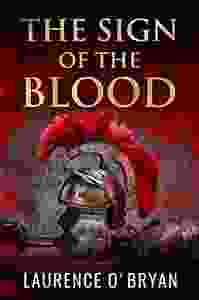

SEPTEMBER 22ND – NOVEMBER 24TH 2020
AMAZON
Publication Date: 22nd November 2018
Publisher: Ardua
Print Length: 469 Pages
Genre: Historical Fiction
The first Christian emperor faces ruthless enemies on his journey to power.
Cool mist settles over the legion advancing toward the Persian army. Constantine, the son of an emperor, the Roman officer leading the attack, tells his men to halt - something is wrong.
Before long, the battle rages. He frees a slave named Juliana. She is half Persian and half Roman. As they are pursued to Britannia over land and sea, he learns that she can see the future - his future.
It is 306A.D., long before Constantine the Great converted to Christianity and became the first Christian emperor.
To ensure he survives, he must eliminate his enemies. But who must die first? The priestess, Sybellina, who joined them in Rome and practices dark and seductive magic? Or the brutal legion commanders who surround his father? Or, as Juliana suspects, are those who want him dead even closer?
A gripping historical novel about Constantine’s bloody rise to power, the woman who helped him, and the real reason he supported a persecuted Christian minority, a decision which changed the world into the one we know.
We are stopping over on over on Brook's Scroll today for a fabulous interview:
Click HERE!

Welcome to Day #4 of the blog tour for A Feigned Madness by Tonya Mitchell #HistoricalFiction #BlogTour #CoffeePotBookClub @tremmitchell @authorrochelle

A Feigned Madness
By Tonya Mitchell
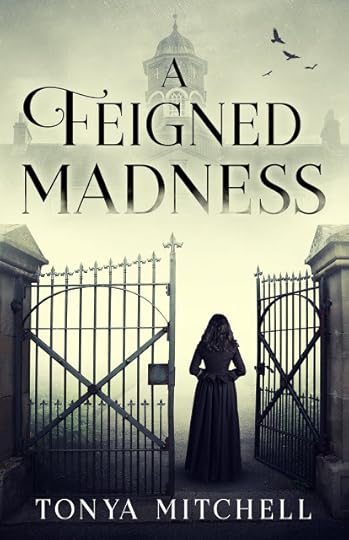
October 6th — December 8th 2020
Publication Date: 6th October 2020Publisher: Cynren Press
Print Length: 392 pages
Genre: Historical Fiction, Historical Thriller
The insane asylum on Blackwell’s Island is a human rat trap. It is easy to get in, but once there it is impossible to get out. —Nellie Bly
Elizabeth Cochrane has a secret.
She isn’t the madwoman with amnesia the doctors and inmates at Blackwell’s Asylum think she is.
In truth, she’s working undercover for the New York World. When the managing editor refuses to hire her because she’s a woman, Elizabeth strikes a deal: in exchange for a job, she’ll impersonate a lunatic to expose a local asylum’s abuses.
When she arrives at the asylum, Elizabeth realizes she must make a decision—is she there merely to bear witness, or to intervene on behalf of the abused inmates? Can she interfere without blowing her cover? As the superintendent of the asylum grows increasingly suspicious, Elizabeth knows her scheme—and her dream of becoming a journalist in New York—is in jeopardy.
A Feigned Madness is a meticulously researched, fictionalized account of the woman who would come to be known as daredevil reporter Nellie Bly. At a time of cutthroat journalism, when newspapers battled for readers at any cost, Bly emerged as one of the first to break through the gender barrier—a woman who would, through her daring exploits, forge a trail for women fighting for their place in the world.
Today we are stopping over on The Historical Fiction Blog for a fabulous Guest Post.
Click HERE!
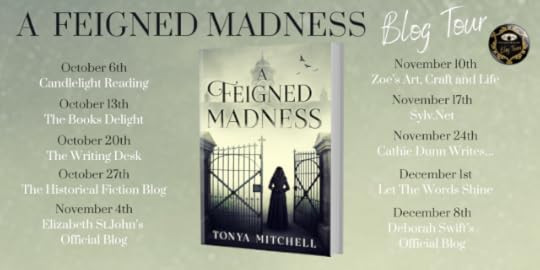
Welcome to Day #7 of the blog tour for The Potential for Love: A Regency Novel by Catherine Kullmann #RegencyRomance #CoffeePotBookClub #BookReview @CKullmannAuthor @ADarnGoodRead @LombardEmma

THE POTENTIAL FOR LOVE: A REGENCY NOVELBY CATHERINE KULLMANN


OCTOBER 19TH - OCTOBER 30TH 2020AMAZON • WATERSTONES • BARNES AND NOBLE
Publication Date: 31 March 2020
Publisher: Willow Books
Print Length: 414 Pages
Genre: Historical Fiction/Historical Romance/Regency Romance/Historical Women’s Fiction
1816
For over six years, Thomas Ferraunt’s thoughts have been of war. Newly returned to England from occupied Paris, he must ask himself what his place is in this new world and what he wants from it. More and more, his thoughts turn to Arabella Malvin, but would Lord Malvin agree to such a mismatch for his daughter, especially when she is being courted by Lord Henry Danlow?
About to embark on her fourth Season, Arabella is tired of the life of a debutante, waiting in the wings for her real life to begin. She is ready to marry. But which of her suitors has the potential for love and who will agree to the type of marriage she wants?
As she struggles to make her choice, she is faced with danger from an unexpected quarter while Thomas is stunned by a new challenge. Will these events bring them together or drive them apart?
We are celebrating the release of the special hardback edition of The Potential for Love during this tour. With a beautiful dust jacket over an elegant laminated cover, it will enhance any library and is the perfect gift for lovers of historical women’s fiction and historical romance.
Check out this fabulous review by A Darn Good Read:
“The Potential for Love is a delightful traditional Regency romance. It is filled with all those wonderful details that allow readers to totally immerse themselves in the era. Catherine Kullman cleverly creates the world that Thomas and Arabella inhabit, right down to the dishes served and the fashions worn, to the more serious aspects of the aftermath of Waterloo and, of course, those strict societal rules that governed the behaviour of the Ton and caused such a dilemma for both Thomas and Arabella… This is the first novel I've read by Catherine Kullman. I was thoroughly entertained and captivated by the story that unfolded and will definitely seek out more of her books.” A Darn Good Read.
Read the review in full HERE!
We are also stopping over on Emma Lombard's Official blog where The Potential for Love is in the Spotlight:
Click HERE!

The Coffee Pot Book Club
...more
- Mary Anne Yarde's profile
- 159 followers



